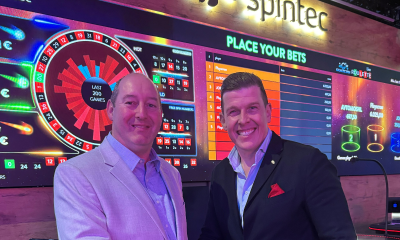Industry News
The untapped potential of SEO in iGaming

With Filip Podborschi, SEO Strategist at The Unit
From our experience in SEO in igaming, there are a number of areas where we see room for improvement and common mistakes which can be rectified. Let’s take a look at these facets of SEO one by one, with our best tips for how to make sure you can maximise your search ranking and drive more volume to your website.
Keyword strategy
The first thing operators should do in this area is identify the best performing keywords that result in higher search volumes on each post. It’s pages that rank rather than websites, so you need a different search intent on each page, and that increases the list of keywords you’re ranking for.
The way to do this is by checking the search volume, and then implementing the keywords according to SEO best practices, which means having primary and secondary keywords and adjusting repetition accordingly.
The common mistake we see here is that companies don’t go into enough depth when conducting competitive analysis; especially when they’re new to the industry. Identifying what exactly your competitors are doing regarding SEO is harder than it looks, and it’s an area where marketing agencies tend to be quite lazy. They may use some tools which will show the standout competitors by algorithm, but they won’t crawl for long enough to ascertain what services they offer and provide a comparison with their client’s service. You need to find out which sites could be ranking better than you, and why.
We also see issues with the ranking of sites based on the user’s location. For example, you may have a website that ranks well in Canada, and when I as a user based in Romania search for that category, I’m not going to get the same list of results as a user who is based in Canada. The best thing to do is use a VPN to gauge how your websites are ranking and performing with your specific audience in your domestic geographical area.
SEO tags optimisation
With SEO tags, which are essentially the page title and description you see on the search engine results page, the page title has the highest ranking power. Google will first check the page title to get an idea of what the page is about and what searches it is relevant for. It will then check the H1 and the content, and it may look through the H2 as well.
A common issue here is some websites have templated SEO tags, especially for the inner pages, so it’s more of a formula within the code to generate a random structure. It is very obvious they are templated and that the operator doesn’t really care about the length.
The key thing with tags is to make sure your pages have titles that don’t exceed the ideal length. This is a big mistake if you get this wrong, and it is very important to optimise your titles. SEO tags can be optimised around keywords. Once doing so, it is very important to prioritise your main pages. If you have 10 pages as part of the main menu, then you should optimise those, before optimising the inner pages.
Identifying duplicate pages is also important, as well as making sure meta inscriptions include CTAs; those inscriptions don’t impact rankings directly, but they do impact the CTR. You have to do that without being too spammy though, so it’s advisable to avoid words like ‘sale’ or calls to “CLICK HERE NOW”.
Headings
Keywords must be implemented in headings; especially in H1s and H2s. Make sure not to overuse H2s and keep them optimised for content value.
If we structure the ranking power of the elements that are bringing results, we would optimise with the page title first, H1 second, content third and H2s fourth. It is better to have five H2s with three of them being optimised around the same search intent that is highlighted in H1, than it is to have 3/10 optimised around keywords. Too many H2s will just confuse Google about your search intent. You can have similar search intent as with H1s, and also have H3s and H4s to highlight value to the reader.
Interlinking strategy
Interlinking between pages is often missing. I’m not talking about interlinking from the main menu, as every page has the ability for you to go back, but I’m talking about interlinking within content, which Google considers to be much more important, because it cares about the relevancy. Google will consider pages with high-quality content as a higher authority page.
Our advice would be to implement anchor links on both branded and non-branded keywords. You should make sure there is an anchor link to the parent page. For example, domain.com/blog is a parent for domain.com/blog/igaming-seo.
It’s very important to have child pages linking to the parent page, passing authority to the parent page. Having that interlinked structure will pass more authority to that parent page.
To explain that in a little more detail, let’s say you have a sportsbook page with 10 more child pages that reflect a particular set of sports. Having each of those 10 pages optimised so they have some authority and linking them to the parent page would pass authority to that parent page. Parent pages usually have a keyword with higher search volume, and passing as much authority as you can to the child page is very important. Too often websites lack content on child pages.
The future of SEO and experience needed
Going forward, we see AI as one of the most significant developments in SEO. At this point, we are not able to rank user engagement in AI, and it is important to keep yourself updated with how Google is reacting to this.
Google in time may provide additional options if you want to be eligible for a particular set of results in that environment. Keep an eye on what features it will offer and the types of websites. Google may consider implementing specific types of results for betting, such as displaying odds or a comparison of odds from three or four sites at the same time.
With all these issues, it is vital to have the relevant experience on board, particularly when it comes to the skill of conducting very in-depth competitor analysis, and this is something The Unit can provide. Conducting competitor analysis is something we have done across several industries, and not just in igaming. The main strength you can have with SEO is to know your competitors inside out, and those skills can be adjusted based on your needs.
The post The untapped potential of SEO in iGaming appeared first on European Gaming Industry News.
Gaming Laboratories International
GLI Promotes Patrick Cottingham to Director of Client Services, North America

Gaming Laboratories International (GLI) has promoted Patrick Cottingham to Director of Client Services, North America. Previously, he served as Senior Manager of Client Services. Prior to commencing his career as an engineer with GLI, he served with the US Air Force.
Cottingham’s dedication to his clients was clearly evident both inside and outside of GLI. He transitioned to the Client Services team where he progressed and built a team laser focused on providing the very best customer service where his and his team’s clients have benefited from his engineering and gaming experience.
Ian Hughes, GLI Chief Revenue Officer, said: “We are thrilled to announce Patrick’s well-deserved promotion to Director of Client Services for North America. Patrick leads a team of dedicated and committed client services representatives who ensure our clients receive the best service during their compliance journey with GLI.”
The post GLI Promotes Patrick Cottingham to Director of Client Services, North America appeared first on Americas iGaming & Sports Betting News.
Blueprintx
Zingo Bingo Launches “Your Era” Nostalgia Series Featuring Kerry Katona and Pat Sharp

Zingo Bingo Launches “Your Era” – A Social-First Nostalgia Series for 2026
Zingo Bingo has officially unveiled Your Era, a new short-form social media content series celebrating iconic throwbacks, shared nostalgia and the cultural moments that defined generations. The series launches in February 2026 and will roll out weekly across TikTok, Instagram, Facebook and YouTube.
Designed to strengthen Zingo Bingo’s identity as a home of nostalgic fun, Your Era focuses on authentic conversation rather than traditional promotional content. The format highlights music, fashion, technology and pop culture milestones that shaped each guest’s personal journey.
Kerry Katona and Pat Sharp Headline Series One
The first confirmed guests include Kerry Katona, singer and media personality best known from Atomic Kitten, and Pat Sharp, the iconic radio and TV presenter associated with classic UK entertainment shows. Additional celebrity names will be revealed throughout the year.
Each episode features five themed nostalgia segments crafted to spark memories, conversation and emotional connections among viewers.
What to Expect from “Your Era”
Every guest takes part in recurring throwback features designed to boost engagement and relatability:
- The Memory Bag – Guests reveal five nostalgic items and share the stories behind them
- Flashback Files – A rapid-fire interview covering music, fashion, tech and cultural trends
- Mixtape Memories – Guests curate throwback tracks for the official Your Era playlist
- Taste of the Past – Sampling retro sweets and snacks while rating nostalgia levels
- Yesterday’s News – A humorous headline-guessing game using real throwback media stories
The series aims to tap into the growing popularity of nostalgia-driven digital content while positioning Zingo Bingo as a community-led entertainment brand.
Built by Kinetic Digital and Blueprintx
Your Era has been developed by Zingo Bingo’s operators, Kinetic Digital, in collaboration with long-term creative partner Blueprintx. Blueprintx has previously supported digital and television campaigns for Kinetic Digital brands including Prime Casino and Slingo.
The production strategy prioritises shareable, short-form content optimised for social discovery and influencer amplification, with episodes distributed across dedicated platform pages as well as guest channels.
A Strategic Play for Community Engagement
Jack Watson, Brand Manager at Zingo Bingo, said the series reflects the brand’s commitment to fun, familiarity and connection.
“Your Era is about celebrating the music we replayed, the fads we cringe at and the memories that still make us smile. It’s designed to bring people together through shared nostalgia while reminding audiences that bingo is about enjoying those moments collectively.”
Series one will feature six guests throughout 2026, with new weekly segments designed to drive audience engagement and repeat viewership.
The post Zingo Bingo Launches “Your Era” Nostalgia Series Featuring Kerry Katona and Pat Sharp appeared first on Eastern European Gaming | Global iGaming & Tech Intelligence Hub.
Industry News
Ex-Paysafe VP Justin Fraser takes chief revenue officer role at Yaspa to drive global growth

Yaspa, the renowned fintech focusing on instant payments and identity solutions, today reveals the appointment of Justin Fraser as its Chief Revenue Officer.
Fraser becomes part of Yaspa’s executive team during a crucial period of global growth. He has more than 20 years of commercial leadership experience in the payments ecosystem, having occupied senior leadership positions at notable industry companies like Cybersource, Visa, and Paysafe.
Having a career centered on maneuvering through intricate payment environments, he offers knowledge in rapidly expanding, regulated sectors such as iGaming, cryptocurrency, and financial technology.
As the new CRO, Fraser will manage Yaspa’s worldwide commercial strategy, concentrating on expanding the company’s Intelligent Payment platform, which integrates open banking with AI-powered customer insights, throughout the UK, Europe, and North America.
Yaspa CEO James Neville said: “We are thrilled to welcome Justin to the team during this period of rapid acceleration. His deep expertise in navigating complex regulatory environments and his proven track record in scaling payment solutions are invaluable assets as we expand our footprint in the US and beyond. Justin’s appointment further strengthens our leadership as we continue to help businesses lower costs, grow revenues, and enhance financial compliance through open banking.”
Justin Fraser said: “Yaspa is at the forefront of the shift toward real-time payments. The company’s unique blend of open banking and AI-verified insights solves genuine friction for merchants, particularly in industries like iGaming. I am excited to join such an innovative team and look forward to driving the next phase of our commercial growth globally.”
Fraser will collaborate closely with the recently strengthened US team, which includes the newly appointed US Sales Lead, Peter Kula, and US Senior Solutions Manager, Jackson Esoda.
This statement comes after a year of significant growth for Yaspa, highlighted by increasing its workforce from 15 to 75 employees and successfully securing a $12 million investment round spearheaded by Discerning Capital. In this timeframe, the firm broadened its international presence with new ventures in Atlanta and Leeds, while winning esteemed honors such as the 2025 Payments Award for Real-Time Payments Innovation and a spot on the CB Insights Top 100 Fintech list.
The post Ex-Paysafe VP Justin Fraser takes chief revenue officer role at Yaspa to drive global growth appeared first on Eastern European Gaming | Global iGaming & Tech Intelligence Hub.
-

 Amusnet6 days ago
Amusnet6 days agoWeek 7/2026 slot games releases
-

 Aphrodite’s Kiss6 days ago
Aphrodite’s Kiss6 days agoLove on the Reels: Slotland Introduces “Aphrodite’s Kiss”
-

 Brino Games6 days ago
Brino Games6 days agoQTech Games integrates more creative content from Brino Games
-

 Baltics7 days ago
Baltics7 days agoEstonia to Reinstate 5.5% Online Gambling Tax From March 1
-

 Denmark7 days ago
Denmark7 days agoRoyalCasino Partners with ScatterKings for Company’s Danish Launch
-

 Booming Games7 days ago
Booming Games7 days agoTreasure Hunt Revival — Booming Games Launches Gold Gold Gold Hold and Win
-

 ELA Games7 days ago
ELA Games7 days agoELA Games Unveils Tea Party of Fortune — A Magical Multiplier Experience
-

 Bet Rite7 days ago
Bet Rite7 days agoSpintec Expands into Canada with Bet Rite































